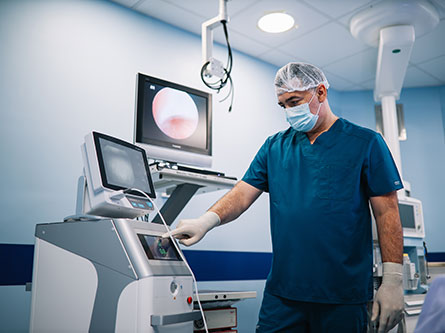
It's an alarming trend: diagnoses of colorectal (colon) cancer are on the rise in people under age 50. This led the U.S. Preventative Services Task Force to change its recommendations in May 2021 for colon cancer screenings to begin at age 45. Before that, it was recommended that colon cancer screenings begin at age 50.
Additionally, there was a spotlight put on colon cancer in August 2020 when "Black Panther" star Chadwick Boseman died of the disease at age 43. His family said in a statement that Boseman was diagnosed with colon cancer four years prior.
While colon cancer is rare in young adults, it's the third most common cancer and second most common cause of cancer deaths worldwide, according to the National Cancer Institute. This is why it's important to know the early signs of colon cancer.
What is colorectal cancer?
Colorectal cancer includes colon cancer and rectal cancer. It's a disease in which cells in the colon or rectum grow out of control. Abnormal growths, called polyps, sometimes form in the colon or rectum. Over time, these polyps can develop into cancer.
According to the American Cancer Society, the risk of developing colorectal cancer is about 1 in 23 for men and 1 in 25 for women. Genetic, environmental and lifestyle factors can affect your risk for colorectal cancer.
Learn more about colorectal cancer
What signs of colon cancer should you look for?
Polyps in the colon and colorectal cancer don't always cause symptoms, especially at first. Some symptoms of colon cancer may include:
- A change in bowel habits
- Blood in or on your stool (feces)
- Rectal bleeding with bright red blood
- Diarrhea, constipation, or feeling that your bowel doesn't fully empty
- Unexpected weight loss
- Cramping or belly pain
- Weakness and fatigue
If you have any of these symptoms, talk to your physician. These could be a sign of something other than cancer. But you will only know what's causing these symptoms if you are seen by your doctor.
Why is there an increase in colon cancer cases among young adults?
Colorectal cancer is the leading cause of cancer death among people under 50. Health experts aren’t sure what's causing the rise in colon cancer diagnoses. However, poor diet and lack of physical activity may be part of the reason.
Millennials (people born between 1981-1996) have twice the risk of colorectal cancer compared to those born in 1950, according to a 2017 study. The same research found that people under age 55 are nearly 60% more likely to be diagnosed with late-stage disease than older adults. That makes the odds of surviving the colon cancer more challenging.
Read more: 'Alarming' rise in colon cancer rates among younger people
What screenings are offered to detect colon cancer?
A colonoscopy is the gold standard for screening. It is the preferred way to diagnose these types of cancers. Colonoscopy allows your doctor to directly inspect the inside of the colon. It has the added advantage of allowing your doctor to remove potentially pre-cancerous polyps when detected.
There are other screening tests that look at cancer DNA or blood in the stool (feces). But these tests are not appropriate for all patients, especially those at higher risk.
Read about what happens during a colonoscopy and how to prepare
What should I know about a colonoscopy?
Colon cancer can be prevented through early detection. A colonoscopy is a routine procedure that's been done for decades. The patient is asked to prepare in advance by sticking to a special liquid diet. Once at the doctor's office, the patient is given anesthesia and typically has no memory of the procedure.
During a colonoscopy, a thin, tube-like instrument with a light and a lens for viewing is inserted into the rectum. It may also have a tool to remove tissue that can be checked for signs of disease.
The risks related to the procedure are very low compared to the benefits of finding underlying disease that could go undetected.
Learn whether a colonoscopy or at-home colon cancer screening test is right for you
When should people start getting screened for colon cancer?
In May 2021, the U.S. Preventative Services Task Force changed its recommendations for colon cancer screening to begin at age 45, rather than 50. This is because of the increased diagnoses of colorectal cancer in younger adults.
If you have symptoms of colon cancer, don't wait. You can advocate to get screened even if your age does not fall into the guidelines.
What happens if screening detects polyps?
If a colonoscopy or other screening detects precancerous polyps, the next steps depend on what your physician finds. If the polyps are tested and are not precancerous, and there are no symptoms, the patient can return to get checked every 10 years. Polyps that are precancer can be safely removed and can prevent colon cancer.
Any additional treatment depends on which type of cancer it is, how big it is, and whether it has spread. Treatments for colorectal cancer can include surgery, radiation, and chemotherapy, among other treatments. Talk to your physician openly and ask questions if you don't understand something.
Explore colorectal cancer treatments at UC Davis Comprehensive Cancer Center




